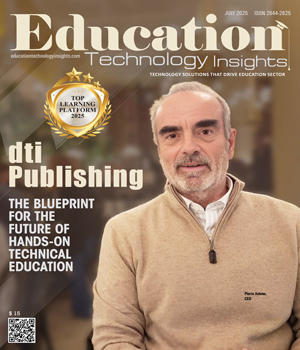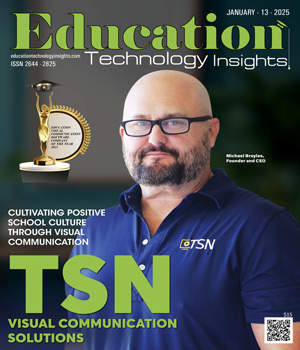THANK YOU FOR SUBSCRIBING
Be first to read the latest tech news, Industry Leader's Insights, and CIO interviews of medium and large enterprises exclusively from Education Technology Insights
Nurturing Leaders: Fostering IT Leadership Development in Higher Education
Kenneth Ferguson, Director of Information Technology at The Friday Institute for Educational Innovation.
 Kenneth Ferguson, Director of Information Technology at The Friday Institute for Educational Innovation.
Kenneth Ferguson, Director of Information Technology at The Friday Institute for Educational Innovation.Kenneth Ferguson is a detail-oriented Director of Information Technology at NC State University, with a background in physical security/law enforcement and operational management. With 14 years of experience, he excels in advanced technology, data communications, and desktop technology. He is a dedicated go-getter, setting and achieving goals while prioritizing team capabilities.
As technology continues to reshape the landscape of higher education, IT departments play a critical role in supporting and advancing the institution's mission. However, the dynamic nature of technology requires skilled leaders who can navigate the ever-evolving challenges and opportunities in this digital era. In this article, I, Kenny Ferguson, the IT Director at NC State's Friday Institute, will delve into the importance of leadership development in IT within higher education and the strategies we employ to cultivate exceptional leaders.
At the Friday Institute, we firmly believe that effective leadership is the cornerstone of IT innovation and progress. To thrive in this rapidly changing environment, IT leaders must possess a unique blend of technical expertise, strategic vision, and the ability to inspire and empowertheirteams.Therefore,investinginleadershipdevelopmentprogramsisparamountto create an environment that fosters growth, collaboration, andadaptability.
“While formal education equips individuals with foundational knowledge, hands-on experiences are vital to developing leadership skills.”
One key aspect of our leadership development initiatives is mentorship. We recognize the invaluable role mentors play in nurturing emerging leaders. Pairing seasoned IT professionals with aspiring leaders fosters a culture of knowledge-sharing, continuous learning, and professional growth. Through regular one-on-one interactions, mentors provide guidance, share experiences, and challenge mentees to think beyond their comfort zones. This personalized approach cultivates a sense of belonging and inspires the next generation of IT leaders to excel.
In addition to mentorship, we embrace experiential learning as a fundamental component of our leadership development framework. While formal education equips individuals with foundational knowledge, hands-on experiences are vital to developing leadership skills. We encourage our IT team members to engage in cross-functional projects, collaborate with other departments, and participate in community outreach programs. These opportunities allow them to gain a holistic understanding of the organization, develop effective communication and teamwork skills, and foster a sense of empathy for diverse perspectives.
Furthermore,westronglyadvocateforacultureofcontinuouslearningwithinourITdepartment. As technology rapidly evolves, staying up-to-date is critical. We encourage our team members to pursue professional development opportunities such as workshops, conferences, and certifications. By investing in their growth, we empower our IT professionals to become lifelong learners, adaptable to the ever-changing IT landscape. We also facilitate knowledge-sharing sessions where team members can present on new technologies or emerging trends, fostering a culture of intellectual curiosity and collectivegrowth.
Equally important in our leadership development approach is fostering a culture that values diversity, equity, and inclusion (DEI). In the IT realm, diversity brings a multitude of perspectives, experiences, and ideas, which fuels innovation and creativity. We actively promote inclusivity by providing equitable opportunities for all team members and establishing a safe and respectful environment where everyone's voice is heard. We believe that embracing diversity at all levels of leadership enhances our ability to tackle complex challenges and create inclusive technological solutions that serve our diverse student body and campus community.
To ensure the sustainability and effectiveness of our leadership development efforts, we continually evaluate their impact. We gather feedback from participants and assess their growth and development throughout the program. We use this information to refine and adapt our initiatives, ensuring they meet the evolving needs of our IT professionals.
In conclusion, leadership development in IT within higher education is essential for driving innovation, fostering collaboration, and achieving institutional goals. By prioritizing mentorship, experiential learning, continuous professional development, DEI, and evaluation, we can cultivate a cadre of exceptional IT leaders who are equipped to navigate the challenges and seize the opportunities presented by the rapidly evolving technological landscape. At the Friday Institute, we remain committed to nurturing leaders who will shape the future of higher education through their vision, expertise, and dedication.
Weekly Brief
Read Also
Building Future Leaders with Faith and Integrity
Virtualization as a Bridge For Multi-Campus Support
Building Practical Readiness in Cybersecurity Talent
The Liberal Arts to the Rescue
Faith Based Counseling Supporting Holistic Student Growth
Will ChatGPT End Higher Ed? Not So Fast

I agree We use cookies on this website to enhance your user experience. By clicking any link on this page you are giving your consent for us to set cookies. More info

























